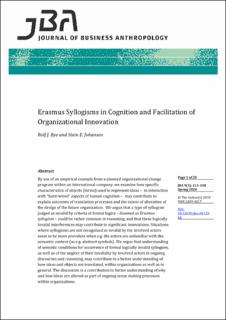| dc.contributor.author | Bye, Rolf Johan | |
| dc.contributor.author | Johansen, Stein Erik | |
| dc.date.accessioned | 2023-03-28T12:59:31Z | |
| dc.date.available | 2023-03-28T12:59:31Z | |
| dc.date.created | 2019-08-19T11:12:52Z | |
| dc.date.issued | 2020 | |
| dc.identifier.citation | Journal of business anthropology. 2020, 9 (1), 111-138. | en_US |
| dc.identifier.issn | 2245-4217 | |
| dc.identifier.uri | https://hdl.handle.net/11250/3060758 | |
| dc.description.abstract | By use of an empirical example from a planned organizational change program within an international company, we examine how specific characteristics of objects (forms) used to represent ideas – in interaction with “hard-wired” aspects of human cognition – may contribute to explain outcomes of translation processes and the extent of alteration of the design of the future organization. We argue that a type of syllogism judged as invalid by criteria of formal logics – denoted as Erasmus syllogism – could be rather common in reasoning, and that these logically invalid interferences may contribute to significant innovations. Situations where syllogisms are not recognized as invalid by the involved actors seem to be more prevalent when e.g. the actors are unfamiliar with the semantic content (as e.g. abstract symbols). We argue that understanding of semiotic conditions for occurrence of formal logically invalid syllogism, as well as of the neglect of their invalidity by involved actors in ongoing discourses and reasoning, may contribute to a better understanding of how ideas and objects are translated, within organizations as well as in general. The discussion is a contribution to better understanding of why and how ideas are altered as part of ongoing sense making processes within organizations. | en_US |
| dc.language.iso | eng | en_US |
| dc.publisher | Journal of Business Anthropology | en_US |
| dc.relation.uri | https://rauli.cbs.dk/index.php/jba/article/view/5964 | |
| dc.rights | Attribution-NonCommercial-NoDerivatives 4.0 Internasjonal | * |
| dc.rights.uri | http://creativecommons.org/licenses/by-nc-nd/4.0/deed.no | * |
| dc.title | Erasmus syllogisms in cognition and facilitation of organizational innovation | en_US |
| dc.type | Peer reviewed | en_US |
| dc.type | Journal article | en_US |
| dc.description.version | publishedVersion | en_US |
| dc.rights.holder | © The Author(s) 2020 | en_US |
| dc.source.pagenumber | 111-138 | en_US |
| dc.source.volume | 9 | en_US |
| dc.source.journal | Journal of business anthropology | en_US |
| dc.source.issue | 1 | en_US |
| dc.identifier.doi | 10.22439/jba.v9i1.5964 | |
| dc.identifier.cristin | 1717010 | |
| cristin.ispublished | true | |
| cristin.fulltext | original | |
| cristin.qualitycode | 1 | |

